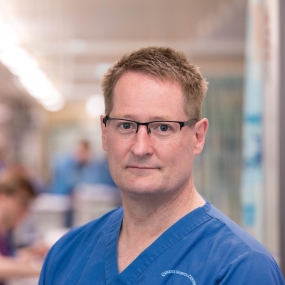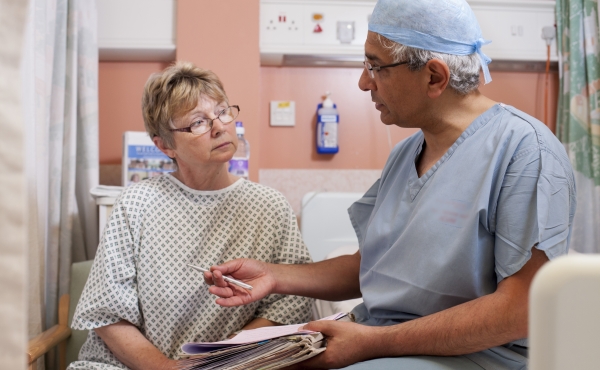Perioperative Care – The ‘Holy Grail of Healthcare’

The following blog has been published in line with CPOC's own rapid research review that highlights the impact of perioperative care and our pioneering new evidence.

The RCoA Policy team have undertaken an extensive rapid research review looking at over 27,000 studies and details why perioperative care is the answer to the future of healthcare.
Never has there been so important a moment to institute rapid large-scale transformational change. Coronavirus has hindered the NHS’ ability to provide elective surgery, detonating what the Royal College of Surgeons has dubbed “a time bomb” under the waiting list crisis.
For the 250,000 high-risk patients with complex needs having surgery each year, the likelihood of further deterioration in their health and of post-surgery complications has now increased exponentially. With 50% of NHS hospital costs accounted for by just 7% of in-patients with complex needs, so the costs of care are also increasing; compounded by an inequalities gap of where 28% of patients aged 65–74 living in the most-deprived fifth of England have four or more co-morbidities.
In March, as the pandemic took hold, we wrote about the work being undertaken by the CPOC to realise our vision of a truly integrated, multidisciplinary, surgical care pathway, with the patient the most important member of the team. CPOC has now published, perhaps for the first time on this scale, comprehensive evidence that the perioperative pathway is associated with higher quality clinical outcomes, reduced financial cost and better satisfaction for surgical patients. This triad is the holy grail of healthcare. Findings from a major review of over 27,000 studies reveal that perioperative care:
1. reduces length of in-patient stays by an average of 1-2 days
2. reduces complication rates after surgery by 30-80%,
3. reduces the need for post-surgery intensive care
4. supports people to feel well sooner, reducing the costs of care, and societal costs
5. improves how prepared patients feel for surgery
6. increases how empowered and satisfied patients are with their care
7. improves communication between surgical patients and their health teams.
Yet, despite the evidence, many NHS hospitals do not offer a perioperative pathway for their patients with joined up care throughout their surgical journey. Ongoing barriers to collaboration mean that only 16% of doctors feel there is clear communication between primary and secondary care. Few integrated care models have seized the potential of perioperative care to reshape services to transform their patients’ surgical pathways.
However, there is cause for optimism.
The pandemic has catalysed rapid innovation, greater system working and recognition that the needs of surgical patients matter more than the silos of medical specialities or institutions. This focus on collaboration is at the heart of the Future Doctor Vision, which calls for a shift from a system valuing “specialism’’ to one equipping doctors in the management of complex care, co-morbidities, and providing a deeper connection [with] communities.” So too the NHS People Plan pledges to support multi-professional teams designed around the full range of experience of clinical and non-clinical members.
Now is the time to ensure that every surgical patient’s journey is delivered along a single, coordinated care pathway, supported by an appropriate multi-professional team. Now is the time to deliver seamless communication and collaboration between primary, secondary and community care. Now is the time to review our patient flows and how we counsel and prepare patients for surgery. And now is the time to empower patients through shared decision-making and personalised care, and to change the postoperative course with emphasis on enhanced recovery.
In turn, as the Government starts a conversation about the future of public health, it is critical that prevention does not become the ‘local authorities’ plan’ and the NHS Long-Term Plan, the ‘NHS’s plan’. During the pandemic, the public has been confronted with the risks of co-morbidities. How obesity, for example, increases the risks of Coronavirus. There can be no doubt about the vital role secondary care has to play in prevention. Perioperative care is a key part of this solution.
The preoperative period, a time when people are particularly receptive to health promotion messaging, is a ‘teachable moment’. Patients require information about the risks related to co-morbidity and information about and access to timely interventions. For example, stopping smoking four weeks before an operation reduces the risk of complications by 19%. Perioperative care can promote positive, lasting, lifestyle change at scale across populations, and ‘level up’ health inequalities. That’s why NHS England’s National Medical Director encourages “all system leaders within an Integrated Care System…to consider how a perioperative approach could improve patient care in their area.”
So, what next? CPOC is working cross-sector to realise a number of immediate opportunities to embed perioperative care into routine clinical practice, and making the case for greater investment to develop and evaluate perioperative pathways. Perioperative care isn’t about re-inventing the wheel. It’s about using the skills and resources that already exist and working differently to provide an optimised, integrated, pathway for surgical patients. Our new evidence proves the case.


